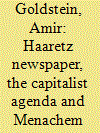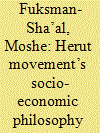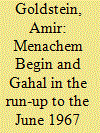| Srl | Item |
| 1 |
ID:
180062


|
|
|
|
|
| Summary/Abstract |
In the first elections for the Israeli parliament (January 1949) WIZO ran as a women's party seeking equal rights for women. It won enough votes for a parliamentary seat – highly unusual in that day and age. WIZO was unique in that it started out as an apolitical women's organisation aligned with the mid-stream Zionist consensus and redefined itself as a party fighting for gender equality.This article examines the developments in the General Zionist Party that led WIZO, founded as a women's philanthropic organisation, to run as an independent political party on its own platform on the eve of the establishment of the State of Israel. It will also look at the impact of WIZO party on Israel's center-right - the General Zionists, the Progressive party and Herut - in the context of the Constituent Assembly elections. The establishment of a women's party in 1948-49 was a unique phenomenon with no equal anywhere in the world at the time.
|
|
|
|
|
|
|
|
|
|
|
|
|
|
|
|
| 2 |
ID:
158161


|
|
|
|
|
| Summary/Abstract |
During the 1960s, the Haaretz newspaper was a staunch supporter of the key political decisions made by Menachem Begin, thus playing a significant role in reinforcing his legitimacy and that of his Herut movement. On the one hand, this support was motivated by the desire to transform Israel’s socialist economy into a freer and less government-controlled market. On the other hand, it stemmed from the aspiration to democratise Israel’s political life. This symbiosis began to emerge in the early 1960s and was sustained over a lengthy period of time, thus underscoring the role played by Israeli bourgeois-liberal circles in the Zionist Right’s path to power.
|
|
|
|
|
|
|
|
|
|
|
|
|
|
|
|
| 3 |
ID:
163290


|
|
|
|
|
| Summary/Abstract |
This article examines the Herut movement’s social and economic alternative to the ruling Mapai party, characterised by a liberal-individualistic outlook and a general vision of converting the centralised economy to an economy in which private initiative and competition dominate. On 17 May 1977 the Herut movement became the ruling party through its Likud electoral bloc, with economic reforms quickly following. These reforms encountered difficulties: the declared ‘economic turnabout’ harmed the strength of the economy. Inflation rates reaching several hundred per cent, frequent devaluations, and a loss of faith in the Israeli currency threatened stability. Nevertheless, from the social perspective, Herut did indeed succeed in bettering the conditions of its loyal voters in the development towns and distressed neighbourhoods.
|
|
|
|
|
|
|
|
|
|
|
|
|
|
|
|
| 4 |
ID:
154057


|
|
|
|
|
| Summary/Abstract |
This article discusses the causes and processes that drove Menachem Begin and his Gahal party into the Israeli cabinet during the three-week waiting period preceding the June 1967 war (or Six Day War as it is commonly known). A close examination of Begin’s behaviour reveals a calculated political move aimed at exploiting deep processes within the Israeli political establishment in general, and its right-wing factions in particular. This sheds fresh light on a number of key events preceding the war, notably Prime Minister Levi Eshkol’s surrender of the defence portfolio to Moshe Dayan, as well as on the deeper processes that led within a decade to the Likud’s (Gahal’s successor) rise to power, for the first time in Israel’s history.
|
|
|
|
|
|
|
|
|
|
|
|
|
|
|
|